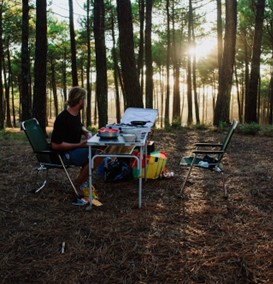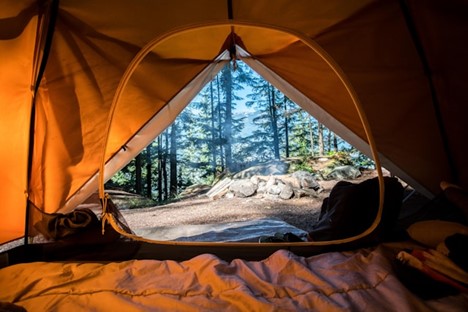Boondock camping, also known as dispersed camping or dry camping, offers outdoor enthusiasts the opportunity to escape into nature and experience the serenity of remote wilderness areas. However, planning nutritious meals for dry camping can pose a unique challenge, as access to amenities like electricity and refrigeration may be limited. In this article, Cory Fitch of Minnesota explores the importance of nutrition while boondocking, providing practical tips for meal planning to ensure you stay energized and nourished during your outdoor adventures.
Understanding Nutritional Needs
Before embarking on a camping trip, it’s essential to understand your nutritional needs to sustain your energy levels and support your outdoor activities. While active, your body requires a balance of macronutrients (carbohydrates, proteins, and fats), as well as micronutrients (vitamins and minerals), to maintain optimal health and performance. Plan meals that are rich in complex carbohydrates for sustained energy, lean proteins for muscle repair and recovery, and healthy fats for satiety and essential fatty acids.
Preparing Portable and Shelf-Stable Foods
When packing food, prioritize portable and shelf-stable options that require minimal refrigeration and preparation. Choose lightweight and compact foods that can withstand outdoor conditions, such as canned beans, dried fruits, nuts, whole grain crackers, and nut butter packets. Additionally, consider investing in dehydrated or freeze-dried meals, which only require water for rehydration and offer a convenient option for quick and easy camping meals.
Incorporating Fresh Ingredients
Incorporating fresh ingredients into your meals can enhance flavor and provide essential nutrients. Pack durable fruits and vegetables that can withstand travel and storage without refrigeration, such as apples, oranges, carrots, bell peppers, and cherry tomatoes. Opt for hearty greens like kale and spinach, which can be used in salads, wraps, or cooked dishes. Don’t forget to wash and prepare produce before your trip and store them in breathable containers or mesh bags to maintain freshness.
Planning Balanced Meals
To ensure you meet your nutritional needs while boondocking, plan balanced meals that include a variety of food groups and flavors. Aim to include a source of carbohydrates (such as whole grains or starchy vegetables), proteins (such as beans, tofu, or canned fish), and healthy fats (such as nuts, seeds, or avocado) in each meal. Get creative with meal ideas, such as campfire burritos, quinoa salad with canned chickpeas, and vegetable stir-fry with canned coconut milk. Don’t forget to pack spices, herbs, and condiments to add flavor and variety to your meals.
Staying Hydrated
Proper hydration is essential for staying healthy and maintaining optimal health. Pack plenty of water or bring a portable water filtration system to purify water from natural sources like streams or lakes. Additionally, consider hydrating foods like cucumbers, watermelon, and oranges, which have high water content and can help replenish electrolytes lost through sweat. Avoid sugary beverages and caffeinated drinks, as they can contribute to dehydration and compromise your hydration status.
Important Essentials
On top of keeping nutrition in mind, it’s important to remember these crucial essentials for dry camping, as these locations are often remote, off-grid, and out of cell service:
Power Source
• Deep-cycle marine battery or lithium-ion battery pack
• Portable solar panels or solar generator
• Power inverter for charging electronic devices
Shelter and Sleeping Gear
• Tent, rooftop tent, or camper van
• Sleeping bag rated for the appropriate temperature
• Sleeping pad or air mattress for comfort
Cooking and Food Supplies
• Portable stove or camping grill
• Propane or butane fuel canisters
• Cooking utensils (pots, pans, spatula, etc.)

Navigation and Communication
- GPS device or smartphone with offline maps
- Two-way radios or walkie-talkies for communication
- Emergency whistle or signaling device
Safety and First Aid
- First aid kit with essential supplies
- Fire extinguisher
- Emergency blanket or sleeping bag
- Multi-tool or Swiss Army knife
- Personal locator beacon (PLB) or satellite messenger
Lighting and Visibility
- LED lantern or portable camping lights
- Headlamp or flashlight with extra batteries
- Reflective gear or markers for visibility at night
Personal Hygiene
- Biodegradable soap and shampoo
- Portable camping toilet or shovel for digging cat holes
- Toilet paper and hand sanitizer
- Towels and washcloths
Tools and Repair Kits
- Basic tool kit (screwdriver, wrench, pliers, etc.)
- Duct tape and zip ties for quick repairs
- Tire repair kit and air compressor
- Spare parts and extra supplies specific to your vehicle or camping equipment
Waste Management
- Trash bags for packing out waste
- Eco-friendly disposable or biodegradable products
- Portable camping sink or handwashing station
By packing these essential items, you’ll be well-prepared for a safe, comfortable, and enjoyable boondock camping experience.
Conclusion
Nutrition plays a crucial role in fueling your adventures and enhancing your outdoor experience while boondock camping. By prioritizing portable and shelf-stable foods, incorporating fresh ingredients, planning balanced meals, and staying hydrated, you can ensure you stay energized and nourished during your outdoor excursions. Remember to pack a variety of foods to satisfy your taste buds and meet your nutritional needs, and don’t forget to practice proper food safety and hygiene while preparing and storing meals in the wilderness. With careful planning and preparation, you can enjoy delicious and nutritious meals while immersing yourself in the beauty of nature during your boondock camping adventures.
